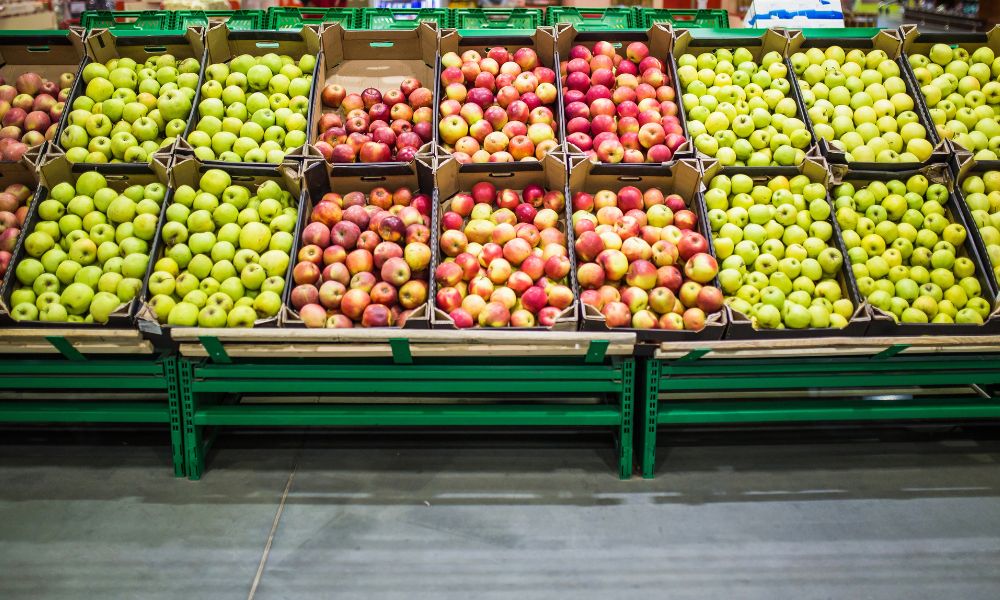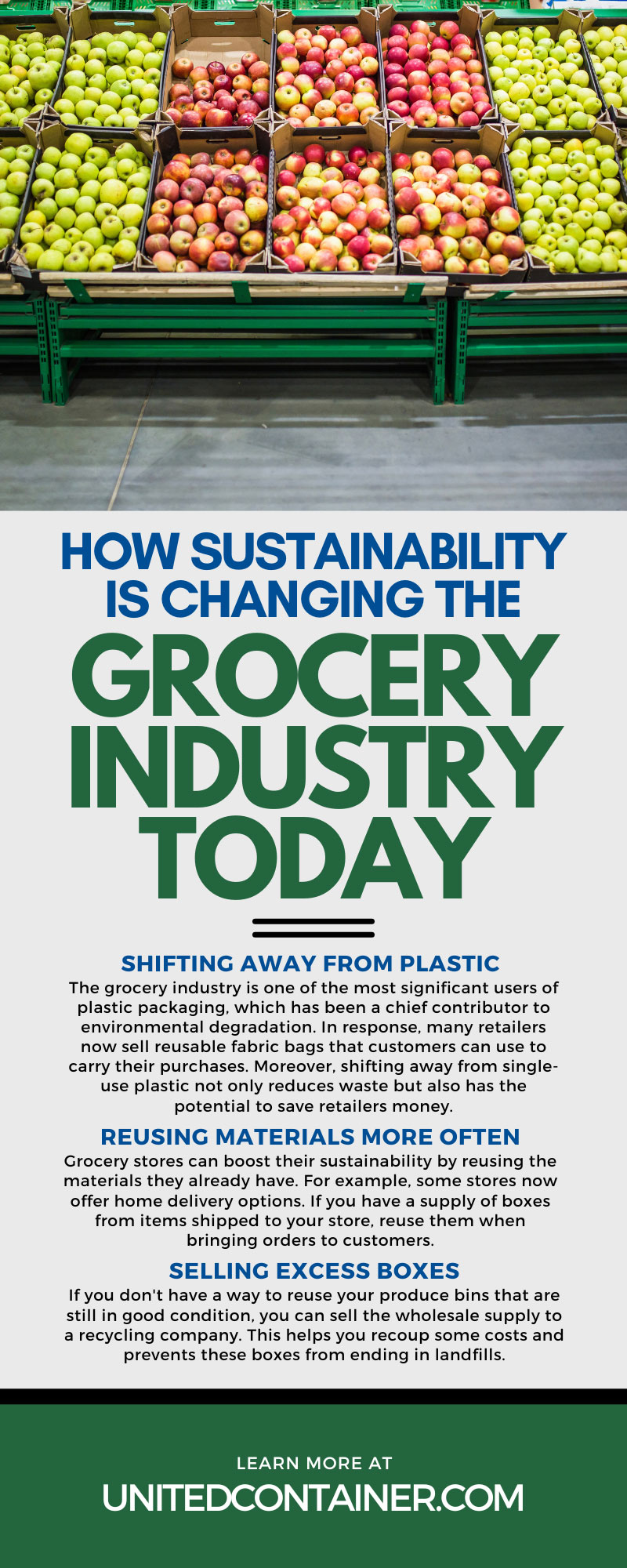
The grocery sector rapidly adapts to eco-friendly practices to meet growing consumer demands. This benefits the environment and boosts sales by appealing to the environmentally conscious consumer’s wallet. The ways to do this range from reducing plastic waste to minimizing food waste. Uncover how sustainability is changing the grocery industry today so that you can be a part of the change.
Shifting Away From Plastic
The grocery industry is one of the most significant users of plastic packaging, which has been a chief contributor to environmental degradation. In response, many retailers now sell reusable fabric bags that customers can use to carry their purchases. Moreover, shifting away from single-use plastic not only reduces waste but also has the potential to save retailers money.
Recycling Plastic Bags
Many stores now have recycling drop-offs for plastic bags and packaging, making it easier for customers to dispose of these materials properly.
Reusing Materials More Often
Consumers are becoming significantly more eco-conscious and reflect this in their choices at the grocery store. People are more likely to buy from grocery stores that offer sustainable options such as reusable produce bags, water bottles, and containers.
Moreover, grocery stores can boost their sustainability by reusing the materials they already have. For example, some stores now offer home delivery options. If you have a supply of boxes from items shipped to your store, reuse them when bringing orders to customers.
The Influence on Shoppers
Many grocery stores have started offering incentive programs for shoppers who bring reusable bags rather than rely on plastic. By offering small discounts or loyalty points to people who make this change, retailers are nudging shoppers to think green.
Selling Excess Boxes
When you receive orders, the items usually come in boxes, leaving you with a surplus of packaging. While you can reuse the containers, some companies don’t have the room to store them or an ideal way of repurposing these boxes.
If you don’t have a way to reuse your produce bins that are still in good condition, you can sell the wholesale supply to a recycling company. This helps you recoup some costs and prevents these boxes from ending in landfills.
United Container Co
Make the shift toward eco-friendly practices and join our effort for a greener planet. United Container Company buys and sells used cardboard boxes for use in the grocery industry.
Implementing Technology
Innovations in technology are proving to be potent tools for sustainability in the grocery sector. Technology is allowing grocery stores to reduce their environmental footprint through the use of smart inventory management systems and blockchain traceability.
Advanced inventory systems help store managers reduce the likelihood of overstocking, which is a common cause of food waste. Likewise, with real-time tracking and predictive analytics, retailers can lower surplus, leading to a reduced need for refrigeration, transportation, and disposal.
Benefits for the Customers
Thanks to technology, stores can also label items that are out of stock so that customers know to check online for them instead. Verifying whether essential items are in the store enables customers to cut down on their carbon emissions by only making trips to the store when necessary.
Reevaluating Shipping Methods
When discussing sustainability in the grocery industry, we usually focus on the stores themselves. However, the shipping and transportation side of things also impacts our environment. Carefully evaluate how you obtain material and how your current shipping process operates.
Selling Local Products
Food often travels a long way to reach store shelves, which contributes significantly to carbon emissions. Selling locally sourced products minimizes the distance food travels, enabling grocery stores to reduce their carbon footprint.
Reimagining Shipping
Many grocery industry professionals look for more eco-friendly ways to package and ship their goods. Some use biodegradable plastic-like substitutes derived from plants, which are catching on. These materials, often made from corn or sugarcane, offer the same utility as traditional plastic but decompose within months.
You may also consider investing in bulk supplies of used boxes to ship goods to your partnering stores; this reduces the manufacturing strain of creating new containers.
Minimizing Food Wastage
Grocery stores are implementing different campaigns to minimize food waste. Some shops offer discounts on items approaching their best-before date to encourage customers to purchase them. The faster you sell what’s on the shelves, the more efficient restocking becomes.
A Benefit of Sell-By Dates
Grocery stores typically use sell-by dates to indicate how long a product can remain on the shelves. If items are nearing their sell-by date and remain unsold, managers often mark down the price to drive up the customer’s desire to purchase.
Donations and Charitable Partnerships
Another significant move to tackle food waste is through donations to food shelters and charitable organizations. Grocery retailers create these partnerships to ensure edible yet unsold food goes to good use rather than ending up in a landfill.
Some stores also resell food to local farmers so that it can be used to feed animals. This is more likely to happen with overstocked or unsold produce that isn’t in a good enough condition for human consumption.
How To Reduce Your Eco-Footprint
There are many ways sustainability is changing the grocery industry, andevery bit of involvement makes a difference. It’s all about being proactive and uncovering different ways to be proactive about food and material waste.
Create a Plan
Start by creating a strategy to implement sustainable practices in your grocery store. Your plan could include setting goals, educating staff and customers, and finding ways to reduce waste throughout the supply chain.
When doing this, you should also evaluate the material used to package and transport your products. If you currently rely on single-use plastic, consider switching to alternatives such as biodegradable materials or reusable packaging.
Educate Staff and Customers
Train staff in proper inventory management techniques and educate them on reducing food waste. If your cardboard containers are too damaged to reuse, ensure employees break them down and place the box in the recycling bin.
Additionally, educate customers through signage or social media posts about your sustainability efforts and how they can help by being conscious consumers. Community involvement also allows you to build a positive reputation and attract customers who value sustainability.
Form the Right Partnerships
Only buy shipping materials from companies that prioritize eco-friendly practices. These types of businesses are more likely to sell and buy back shipping material to help those in the grocery industry reduce waste.
Shop at United Container Company
We sell cardboard produce boxes wholesale in many shapes, styles, and sizes. Contact us today to learn about our inventory so that you can buy the optimal containers. When you have the right boxes, you can reuse them for storage or resale. Join the efforts to keep our communities green!







